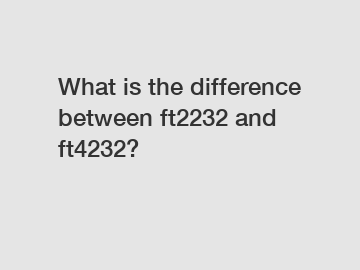Jan. 30, 2024
Electronic Components & Supplies
What is the difference between ft2232 and ft4232?
When it comes to integrating USB functionality into electronic devices, the FT2232 and FT4232 chips by FTDI (Future Technology Devices International) are popular choices. These chips provide USB connectivity and communication capabilities, making them ideal for various applications. However, it is important to understand the differences between these two chips to determine which one suits your specific requirements. In this article, we will explore the dissimilarities between the FT2232 and FT4232, shedding light on their features, specifications, and ideal applications.
FT2232: Dual USB UART/FIFO IC.

The FT2232 chip is a dual USB UART/FIFO IC designed to provide USB connectivity to devices that typically use UART or FIFO interfaces. It features two independent USB-to-serial UART channels and can operate in a variety of modes, including UART, FIFO, and Bit-Bang. This chip supports a wide range of baud rates, making it flexible for various communication needs. It also offers a variety of GPIO (General Purpose Input/Output) pins, allowing for additional I/O capabilities.
Ideal for applications where a device requires multiple serial channels, the FT2232 can be utilized in various sectors, including industrial automation, test and measurement equipment, and embedded systems. Its versatility and robustness make it a popular choice among designers and developers.
FT4232: Quad USB UART/FIFO IC.
In contrast to the FT2232, the FT4232 chip is a quad USB UART/FIFO IC, providing users with four independent USB-to-serial UART channels. Similar to the FT2232, the FT4232 supports multiple communication modes, including UART, FIFO, and Bit-Bang. It also offers a range of GPIO pins for additional I/O capabilities, expanding its potential applications beyond serial communication.
The FT4232 is particularly useful when a device requires multiple serial channels and demands a higher level of connectivity. It finds applications in fields such as industrial automation, healthcare, and communications equipment. The additional UART channels provided by the FT4232 facilitate simultaneous communication with multiple peripheral devices, enabling enhanced data handling capabilities.
Differences and Additional Features.
While both chips offer USB-to-serial UART capabilities, the primary difference lies in the number of channels they provide. The FT2232 features two UART channels, while the FT4232 offers four UART channels, making it more suitable for applications requiring greater connectivity.
Furthermore, both chips have variations that support different voltage levels. For instance, the FT2232H variant supports 1.8V, 2.5V, 3.3V, and 5V logic levels, offering designers flexibility in their projects. Similarly, the FT4232H variant also supports the same voltage levels as the FT2232H.
In terms of software compatibility, both chips are compatible with popular operating systems such as Windows, Linux, and macOS. FTDI provides a comprehensive software development kit (SDK) and drivers, ensuring seamless integration and ease of use for developers.
Conclusion.
To summarize, the FT2232 and FT4232 chips by FTDI cater to different needs in terms of connectivity and communication capabilities. The FT2232, with two UART channels, suits applications requiring multiple serial channels, while the FT4232, with four UART channels, provides enhanced connectivity options. Both chips offer software compatibility and support multiple voltage levels, empowering developers to design and create innovative USB-enabled devices.
If you have further questions or require additional information about the FT2232 or FT4232, please do not hesitate to contact us. Our dedicated team will be delighted to assist you in finding the ideal solution for your specific requirements.
[Contact Us].
Want more information on ZEN132V230A16LS, SSD2828QN4R/SSD2828QN4, TPS63806YFFR? Feel free to contact us.
If you are interested in sending in a Guest Blogger Submission,welcome to write for us!
All Comments ( 0 )